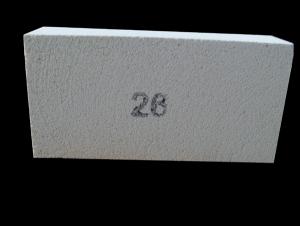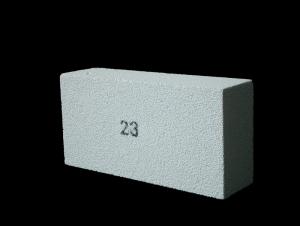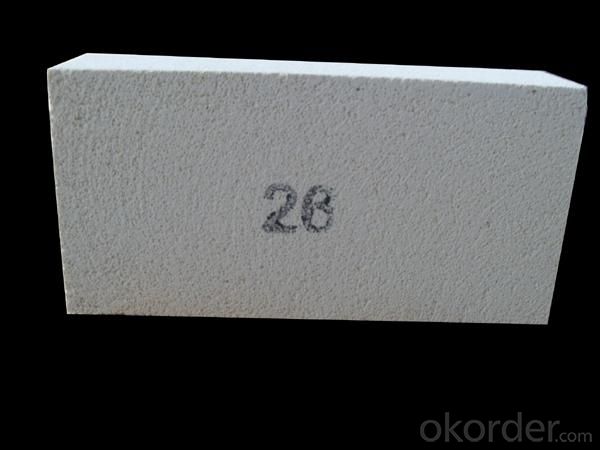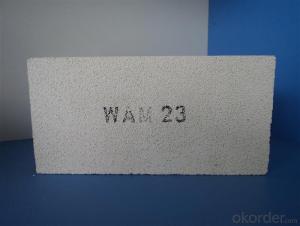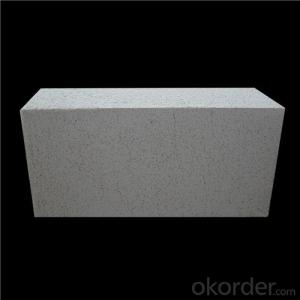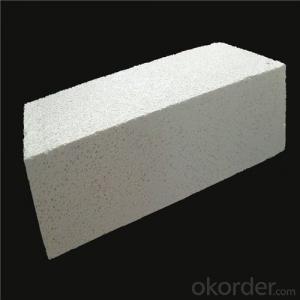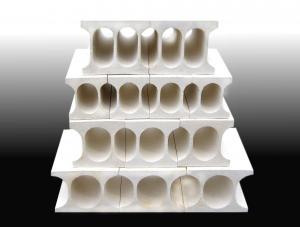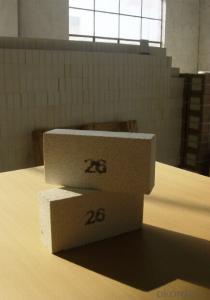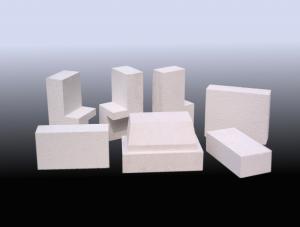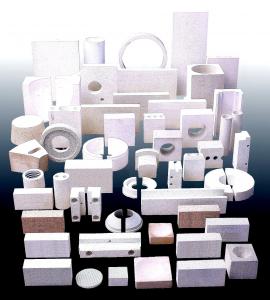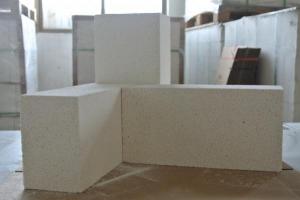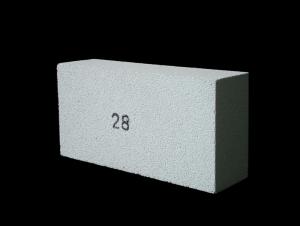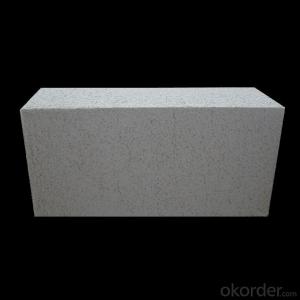Insulating Fire Brick MS23 - High Performance Insulation
- Loading Port:
- China Main Port
- Payment Terms:
- TT or L/C
- Min Order Qty:
- 1000 pcs pc
- Supply Capability:
- 1000 Tons Per Month pc/month
OKorder Service Pledge
OKorder Financial Service
You Might Also Like
General Information of insulating fire bricks MS23
The insulating firebricks temperature is 1260℃(2300℉) and the bricks are manufactured from high purity alumina clay.
Feature of insulating fire bricks MS23
Light weight and low thermal conductivity
Low heat storage
Low iron and impurities
High thermal shock resistance
Application of insulating fire bricks MS23
The insulating firebricks can be used as a hot face lining directly exposed to the heat or as a backup insulation layer in iron and steel mills, non-ferrous foundries, petrochemical, ceramic, glass.
Technical Data of insulating fire bricks MS23
|
| MS23 |
Physical Properties: |
|
|
Classifiction Temperature | ℃ | 1260.0 |
Density | Kg/m3 | 550.0 |
Cold Crushing Strength | Mpa | 1.2 |
Reheating Linear Change(24hrs) |
|
|
1230℃ | % | 0.4 |
Hot Load Strength Deform(90 minutes) |
|
|
1100℃ at 0.034 Mpa(5psi) | % | 0.1 |
Thermal Conductivity |
|
|
400℃ | W/m.k | 0.2 |
600℃ | W/m.k | 0.2 |
800℃ | W/m.k | 0.2 |
1000℃ | W/m.k | 0.2 |
Specific Heat | KJ/Kg.K | 1.1 |
Chemical Analysis: |
|
|
Al2O3 | % | 47.0 |
SiO2 | % | 44.4 |
Fe2O3 | % | 0.9 |
TiO2 | % | 1.2 |
CaO | % | 5.2 |
MgO | % | 0.3 |
Na2O+K2O | % | 1.1 |
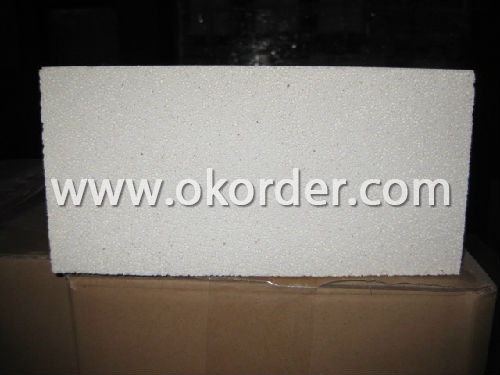
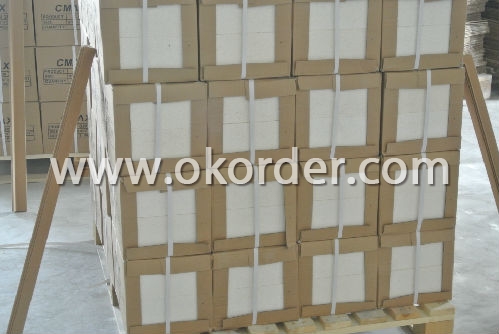
- Q: Are insulating fire bricks suitable for the insulation of chimneys?
- Yes, insulating fire bricks are suitable for the insulation of chimneys. These bricks are designed to withstand high temperatures and provide excellent thermal insulation, making them an ideal choice for chimney insulation. They help to prevent heat loss, improve energy efficiency, and reduce the risk of chimney fires.
- Q: Can insulating fire bricks be used in ceramic industry kilns?
- Indeed, insulating fire bricks find utility in the kilns of the ceramic industry. These bricks are specially crafted to endure extreme temperatures and offer insulation within kilns. With their low thermal conductivity, they facilitate the preservation of uniform heat distribution, thus enhancing the efficiency of firing procedures. Moreover, their lightweight nature simplifies their handling and installation in kilns. The bricks' capacity to retain heat and withstand thermal shock renders them an optimal selection for employment in ceramic industry kilns.
- Q: What is the typical density of an insulating fire brick?
- The typical density of an insulating fire brick is around 0.8 to 1.2 grams per cubic centimeter.
- Q: Advantages and disadvantages of wall insulation system?
- Disadvantages: poor insulation effect (because it is not a full coverage of the insulation layer), there will be condensed water (because the wall is cold, the heat insulation layer is the temperature difference between inside and outside the formation of condensed water), the decoration (insulation layer in the internal decoration of the time on the wall decoration will destroy the insulation layer, comprising an area of effect) (rules of the construction area).
- Q: Can insulating fire bricks be used in solar power plants?
- Yes, insulating fire bricks can be used in solar power plants. They are commonly used in the construction of high-temperature equipment such as solar receivers, combustion chambers, and thermal energy storage systems. Insulating fire bricks help to minimize heat loss and maintain high operating temperatures, making them suitable for various applications in solar power plants.
- Q: Can insulating fire bricks be used in ladle covers?
- Insulating fire bricks can indeed be used in ladle covers. These bricks are specially designed to have low thermal conductivity, which means they can effectively insulate and retain heat. Ladle covers are used in foundries and other high-temperature industries to keep molten metal or other materials hot and prevent heat loss. By using insulating fire bricks in ladle covers, the heat is better retained, resulting in improved energy efficiency and reduced fuel consumption. Additionally, these bricks have high refractory properties, allowing them to withstand the extreme temperatures and thermal shock that ladles are subjected to. Overall, insulating fire bricks are an excellent choice for ladle covers, as they help to maintain temperature stability and conserve heat.
- Q: Can insulating fire bricks be used in brick kilns?
- Yes, insulating fire bricks can be used in brick kilns. Insulating fire bricks are designed to have high thermal resistance, which makes them an ideal choice for insulating the walls of a brick kiln. These bricks can withstand extremely high temperatures and help to maintain consistent heat levels within the kiln. By using insulating fire bricks, the heat loss from the kiln is minimized, resulting in improved energy efficiency and reduced fuel consumption. Additionally, the use of insulating fire bricks can also help to protect the outer layers of the kiln from excessive heat, preventing damage and prolonging the lifespan of the kiln. Overall, insulating fire bricks are a suitable and effective choice for use in brick kilns.
- Q: Are insulating fire bricks resistant to cracking under pressure?
- Insulating fire bricks exhibit resistance to cracking when subjected to pressure. They are specifically engineered to endure elevated temperatures and mechanical strain. Composed of lightweight materials with low thermal conductivity, like ceramic fiber or lightweight aggregates, these bricks maintain their structural integrity even under pressure or thermal expansion. Moreover, insulating fire bricks typically possess a significant alumina content, enhancing their strength and crack resistance. These qualities make them an excellent choice for applications requiring insulation and structural stability, such as furnaces, kilns, and high-temperature industrial processes. Nevertheless, it is crucial to acknowledge that excessive pressure or abrupt temperature changes can still harm insulating fire bricks. Thus, it is essential to adhere to proper installation and maintenance guidelines to ensure their durability and performance.
- Q: Can insulating fire bricks be used in power plants?
- Yes, insulating fire bricks can be used in power plants. These bricks are designed to withstand high temperatures and provide excellent insulation, making them suitable for various applications in power plants, such as lining furnaces, boilers, and kilns. Insulating fire bricks help to conserve energy, improve efficiency, and maintain a stable temperature within power plant equipment.
- Q: Can insulating fire bricks be used in the construction of lime production kilns?
- Insulating fire bricks are a viable option for constructing lime production kilns due to their ability to withstand and retain high temperatures. These bricks possess exceptional insulating properties, enabling the kiln to quickly and efficiently reach the desired temperature while minimizing heat loss. Furthermore, their lightweight nature and ease of handling make them ideal for use in lime production kiln construction. Moreover, these bricks exhibit excellent thermal shock resistance, ensuring they can endure rapid temperature changes without cracking or breaking, a crucial characteristic in the kiln environment. Ultimately, employing insulating fire bricks in lime production kiln construction optimizes the efficiency and effectiveness of the lime production process.
1. Manufacturer Overview
| Location | Jiangsu, China |
| Year Established | 2008 |
| Annual Output Value | Above US$ 35 Million |
| Main Markets | Germany; Italy; Turkey; France; England; Japan; Thailand; Vietnam; Idonesia; USA |
| Company Certifications | ISO 9001:2008 |
2. Manufacturer Certificates
| a) Certification Name | |
| Range | |
| Reference | |
| Validity Period |
3. Manufacturer Capability
| a) Trade Capacity | |
| Nearest Port | Shanghai; Qingdao |
| Export Percentage | 10% |
| No.of Employees in Trade Department | 3 People |
| Language Spoken: | English; Chinese; |
| b) Factory Information | |
| Factory Size: | Twenty five thousand tons per year |
| No. of Production Lines | Above 5 |
| Contract Manufacturing | OEM Service Offered; Design Service Offered |
| Product Price Range | High; Average |
Send your message to us
Insulating Fire Brick MS23 - High Performance Insulation
- Loading Port:
- China Main Port
- Payment Terms:
- TT or L/C
- Min Order Qty:
- 1000 pcs pc
- Supply Capability:
- 1000 Tons Per Month pc/month
OKorder Service Pledge
OKorder Financial Service
Similar products
Hot products
Hot Searches
Related keywords
